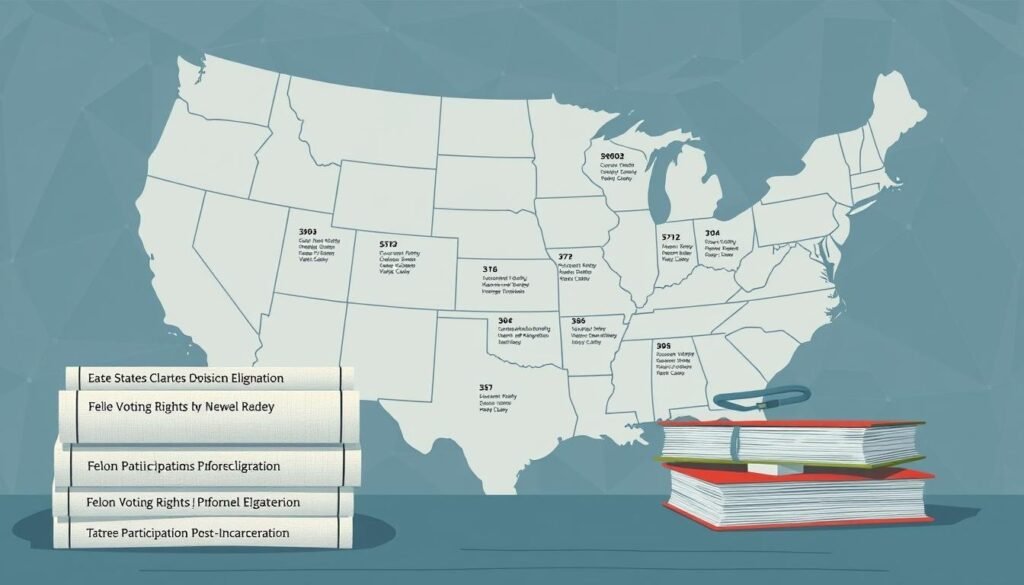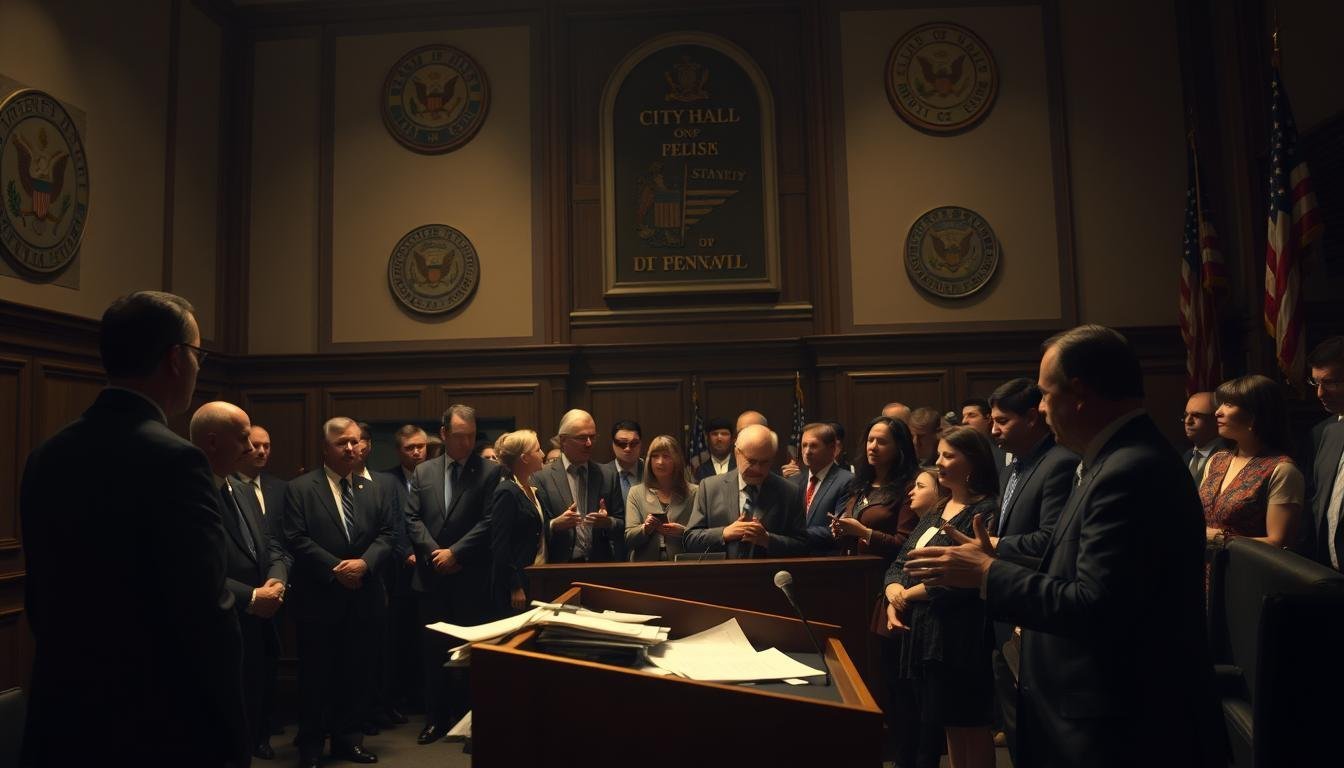Last updated on September 28th, 2025 at 02:08 pm
Felons in Local Government: It’s a big question: Can people with felony convictions hold local government jobs? This topic is both complex and debated by many.
Thinking about it, you might wonder if those with felony records should be in local government. The main issue is finding a balance between giving them a chance and keeping the public’s trust. [Felons in Local Government]
Looking into this, you’ll see there are many legal and ethical points to consider. You’ll learn about the rules and how they affect local government and the community.
Contents
- 1 Felon Rights and Civic Participation
- 2 Can a Convicted Felon Serve in Local Government Positions?
- 3 State-by-State Variations in Felon Eligibility
- 4 Navigating the Path to Public Service with a Record
- 5 Conclusion: Felons in Local Government
- 6 FAQ: Felons in Local Government
- 6.1 Can a convicted felon serve in local government?
- 6.2 What are the eligibility criteria for local government positions?
- 6.3 How do state laws impact felon eligibility for public office?
- 6.4 Can a felon’s record be expunged or pardoned to facilitate public service?
- 6.5 What strategies can felons use to overcome eligibility barriers?
- 6.6 Are there any notable examples of felons serving in local government?
- 6.7 How do local government positions vary in terms of eligibility requirements?
Felon Rights and Civic Participation
The effect of a felony conviction on civic rights is complex and varies by state. It’s important to understand how a felony can limit one’s civic duties and rights.
Civic Duties and Responsibilities
Being convicted of a felony can limit your civic rights. This might include not being able to vote or hold public office. The exact restrictions depend on the state’s laws and the type of felony.
Some states let felons vote after they’ve served their sentence. Others have a longer process for restoring voting rights. [Felons in Local Government]
How a felony affects your ability to work in government also varies. The rules for government jobs differ by state and the type of felony. Some jobs might be off-limits to people with certain felonies.
Civic participation is key to democracy. Knowing the rights and duties of all citizens, including felons, is vital. Laws about felon rights aim to balance individual freedoms with public safety.
The issue of felon rights and civic participation is complex. Different states have different ways of restoring rights and setting rules for government jobs. This shows the need for clear understanding and possible reforms to respect all citizens’ rights.
Can a Convicted Felon Serve in Local Government Positions?
Whether a convicted felon can hold local government positions is a complex issue. It varies a lot from one place to another. It’s key to know the laws and rules that let felons join local government.
Eligibility Criteria for Local Government Positions
Rules for local government jobs differ a lot. These rules are set by state laws or local rules. For felons, the main thing is the type of crime and if it’s been erased or pardoned.
In many places, some crimes mean you can’t hold office. But, the rules can change a lot. For example, some states might keep you out for a while, while others let you run after your sentence is done.
Think about the job too. Jobs that deal with money or law enforcement might have stricter rules. Knowing these details is important to figure out if a felon can apply. [Felons in Local Government]
It’s also important to think about how felons can help their communities. Letting them in local government is a way to help them get back into society. It lets them help their communities.
Being part of local government is key to democracy. For felons, getting back into this can be a big step. But, there are many legal and official barriers to overcome.
To deal with these challenges, felons should learn about the laws in their area. They might need to look up legal info or talk to local election officials. [Felons in Local Government]
State-by-State Variations in Felon Eligibility
Exploring felon eligibility shows how state laws are key. They decide if people with felony convictions can work in local government. Each state has its own rules, making it hard to know what’s allowed. [Felons in Local Government]
What makes someone eligible to hold local government jobs varies. It depends on the type of felony, how long ago it happened, and the state’s laws. For example, some states let felons vote right away after their sentence. Others make it harder.

These differences matter a lot for felons wanting to work in local government. Knowing the laws in their state is very important. It helps them understand if they can serve in public roles.
| State | Felon Eligibility Criteria | Restoration of Rights Process |
|---|---|---|
| California | Eligible after completing sentence | Automatic restoration |
| Florida | Eligible after completing sentence and waiting period | Requires application to Clemency Board |
| New York | Eligible after completing sentence | Automatic restoration upon completion of sentence |
The table shows how different states handle felon eligibility and rights. It’s clear that figuring out these rules can be tough for felons. [Felons in Local Government]
To deal with these challenges, felons need to know their state’s laws. They should also get help from experts or groups that support them. This way, they can find out if they can work in local government and how to get their rights back.
Felony convictions can make it hard to hold local government jobs. But, they don’t always stop you. If you want to serve in public office with a felony record, knowing the challenges and ways to get past them is key.
State laws and local rules might block you because of your felony. But, there are ways to get around these obstacles. [Felons in Local Government]
Strategies for Overcoming Eligibility Barriers
Here are some steps to take to be eligible for government jobs again:
- Expungement: In some places, you can ask to have your felony record erased.
- Pardon: Getting a pardon can bring back your rights and make you more eligible for public office.
- Changes in State Laws: Working to change laws can help remove barriers for people with felony convictions.
To get a better idea of what to expect, look at how expungement and pardon processes vary by state:
| State | Expungement Process | Pardon Process |
|---|---|---|
| California | Petition to the court; requires waiting period | Application to the Board of Parole Hearings |
| Florida | Sealing or expunging records through the FDLE | Clemency application to the Office of the Governor |
| Texas | Petition for expunction or nondisclosure | Application to the Board of Pardons and Paroles |
By learning about these steps and fighting for your rights, you can find your way to public service despite a felony conviction. Serving in local government is a basic right. With determination and the right strategies, you can get past the obstacles. [Felons in Local Government]
Conclusion: Felons in Local Government
Exploring felon rights and local government shows us how complex these issues are. Different states have their own rules about who can hold local government jobs. This makes it important to understand these laws well.
Future Directions for Felon Rights and Civic Participation
Legal changes and social shifts could greatly help felons in local government roles. It’s key to keep talking about these issues and pushing for change. By looking at how felon rights, local government, and civic participation connect, we can build a fairer society.
You can help by staying up to date and joining conversations about these topics. As laws and rules around felon rights change, we must think about how they affect local government and community involvement. We aim for a balance between keeping everyone safe and respecting individual rights.
See Also: Can a Felon Become a Garbage Man?
FAQ: Felons in Local Government
Can a convicted felon serve in local government?
Whether a felon can serve in local government depends on the state and local laws. Some places have specific rules or requirements. [Felons in Local Government]
What are the eligibility criteria for local government positions?
To qualify for local government jobs, you usually need to live in the area, be a certain age, and be a citizen. State laws about felon eligibility can also affect this.
How do state laws impact felon eligibility for public office?
State laws are key in deciding if a felon can hold public office. Some states let felons vote and run for office right away. Others ban them for life.
Can a felon’s record be expunged or pardoned to facilitate public service?
Yes, a felon’s record can be cleared or pardoned in some cases. This might make them eligible for public office. But, the rules and process differ by state. [Felons in Local Government]
What strategies can felons use to overcome eligibility barriers?
Felons can try to clear their record, get a pardon, or push for law changes. They might also need to meet specific state rules or wait a certain time.
Are there any notable examples of felons serving in local government?
Yes, though rare, some felons have held local government jobs. This often happens in places with less strict laws about felon eligibility. [Felons in Local Government]
How do local government positions vary in terms of eligibility requirements?
The rules for local government jobs can change a lot. Some jobs have stricter rules than others. These rules can be set by state laws, local rules, or charter rules.

Van Maldonado, born in California, holds a degree in Criminology and Police Science. Currently serving as an investigative officer at a local police station, he spends his leisure time writing insightful content for FelonScope.com.

